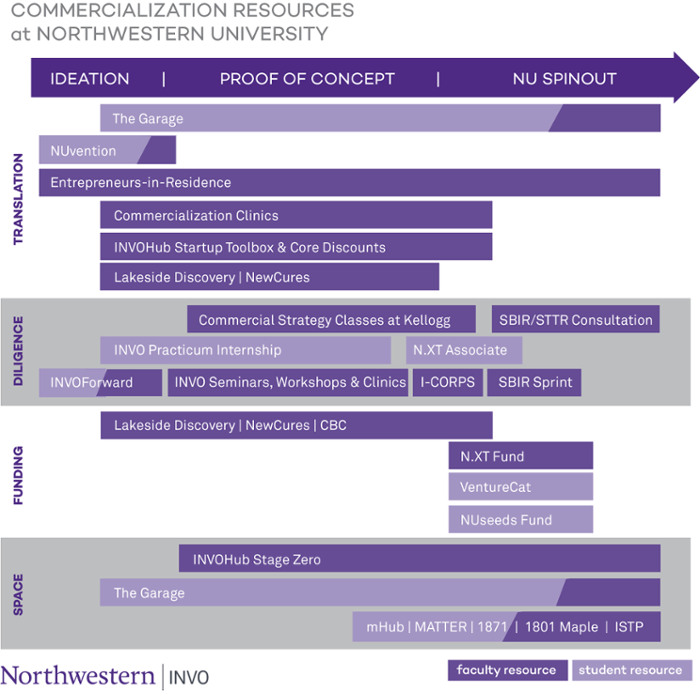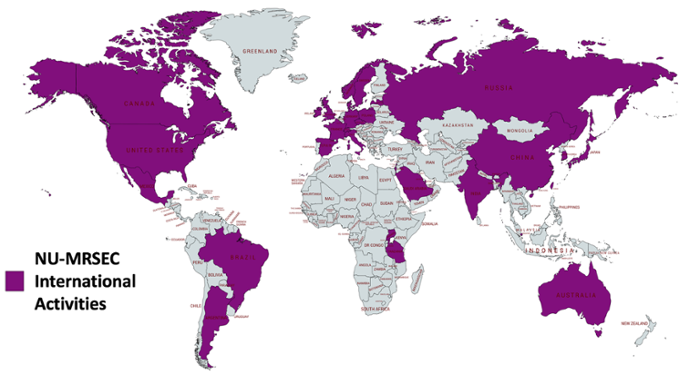Partnerships
Industry Collaborations
The NU-MRSEC provides the physical and intellectual infrastructure to nucleate collaborative opportunities in materials research both on and off the Northwestern campus, and leverages its diverse portfolio of research into new educational and commercial opportunities. Collaborations include campus visits, support for students or postdocs, use of Center-supported shared facilities, development of new techniques and instrumentation, and commercialization of Center technologies.Evidence of successful interaction with the private sector is also found in the track record of Center researchers translating important scientific discoveries into highly marketable technologies. Currently, printable graphene inks developed in the Hersam laboratory are commercially available from Millipore-Sigma. Center faculty have founded several start-up companies including NanoIntegris, Nanosphere, and Polyera, and they provide advice to start-up companies by serving on their technical advisory boards (e.g., Nanosense, SiNode, and Athena Global Energy Solutions). Finally, NU-MRSEC faculty members have leveraged the success of Center-sponsored fundamental research to receive new corporate sponsored research awards.
The NU-MRSEC encourages collaborations with industry for knowledge transfer and facilitates commercialization and entrepreneurial opportunities. For example, the Center has participated in the Design Thinking & Communication (DTC) Course, offered by the McCormick School of Engineering and Applied Science as a requirement for all freshman engineering students, by providing evaluations of design projects through the Segal Design Institute. Regular workshops, such as Patenting 101 for Engineers and Scientists sponsored by the Innovation and New Venture Office (INVO) and Northwestern University Postdoctoral Forum, are also offered to all NU-MRSEC students and postdocs. In collaboration with the Farley Center for Entrepreneurship, the Center also participates in the NUvention course, where participating students worked to develop business plans for technologies developed within the NU-MRSEC.
International Collaborations
International collaborations and activities play an important role in the MRC’s vision. They form ties abroad, enhance the variety of backgrounds participating in the MRC, provide our students with opportunities to explore science and culture in foreign countries, and introduce a route of disseminating the MRC research globally. On the one hand, the Center seeks to improve U.S. research capabilities through international cooperation; on the other it is our goal to enhance materials research, education, and outreach activities around the globe. Currently, international collaborations at the IRG and Seed levels span 4 continents and 30+ academic institutions, industry and national laboratories.
Partnership for Research and Education in Materials (PREM)
In partnership with the University of Texas, Arlington (UTA). NU-MRSEC receives NSF funding from the Partnership for Research and Education in Materials (PREM) program to expand participation and access to materials science-focused facilities, education, training, and careers. Since 2004, the NSF PREM program has broadened access to materials science-focused skills and opportunities by supporting strategic partnerships between minority-serving institutions and NSF-funded research centers and facilities at research-intensive institutions. Partnership for Research and Education in Functional Materials at The University of Texas at Arlington (UTA) and Grambling State University (GSU), in partnership with the NSF Materials Research Science and Engineering Center at Northwestern University (NU-MRSEC), establishes an undergraduate-to-graduate materials research pathway with postdoc opportunities and career placement for students at UTA, a Hispanic-serving institution and Asian American and Native American Pacific Islander-serving institution and GSU, a historically Black university. Research focus: novel polymeric biomaterials and bioinspired materials used for drug delivery and tissue repair with biomedical applications.
Back to top

